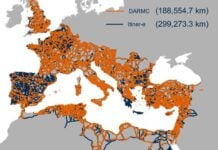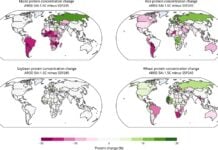Recent research paints a concerning picture of global farming practices, revealing that irrigation—often viewed as a tool to mitigate heat extremes—can ironically exacerbate both human health risks and water scarcity. Three new studies, led by Dr. Yi Yao (Vrije Universiteit Brussel and ETH Zurich), highlight the unintended consequences of widespread irrigation, particularly when combined with climate change.
The Complex Relationship Between Irrigation and Heat Stress
The first study, published in Nature Communications, examined historical irrigation data from 1901 to 2014. By analyzing six advanced Earth system models, researchers discovered that expanding irrigation has indeed helped reduce the frequency of very high air temperatures – what’s commonly known as “dry heat.” However, the study also found a less desirable outcome: irrigation increases air humidity. This diminished its effectiveness in dampening “humid heat” stress, measured by wet-bulb temperature, which is a critical indicator of human heat tolerance.
“We know that humid heat can be more dangerous than dry heat. For the same absolute temperature, humidity significantly affects our ability to cope with heat stress,” explains Dr. Yi Yao.
The research reveals that in certain regions, irrigation has actually worsened humid-heat stress, potentially endangering millions of people. This is a particularly troubling development as humid heat is more likely to lead to heatstroke and other heat-related illnesses.
Future Projections: Escalating Humid Heat Risks
The second study, also published in Nature Communications, looked to the future, projecting how rising greenhouse-gas emissions and irrigation practices together will shape the risks of both dry and humid heat stress over this century. Using an Earth system model with varying emission pathways and irrigation scenarios, the team found that while irrigation can offer some moderation of dry-heat extremes, it’s insufficient to counter the overarching trend of global warming.
“Projections show that people will face many more hours of extreme humid heat each year—in some tropical regions, over a thousand extra hours per year compared to the past. These conditions will be extremely challenging to adapt to,” warns Prof. Wim Thiery.
The projections are particularly alarming for South Asia, a region already experiencing frequent and life-threatening heat waves. Previous research suggests that about three-quarters of children born in India in 2020 will endure unprecedented lifetime exposure to heat waves if current emission trends continue.
The Impact on Freshwater Resources
The third study, published in Nature Water, investigated the effect of the global expansion of irrigation on freshwater resources from 1901 to 2014. Utilizing seven advanced Earth system models, the research found that irrigation has dramatically increased water losses from land through heightened evapotranspiration (the process where water evaporates from the land and transpires from plants). Importantly, these losses haven’t been offset by changes in local rainfall.
This means that, due to rapidly expanding agricultural irrigation, more water is leaving the land than returning through precipitation, creating a significant imbalance. This has led to substantial regional water losses, especially in areas heavily reliant on irrigation. In some regions, land water storage has declined by as much as 500 mm from 1901 to 2014, particularly in South Asia and Central North America.
“Our study raises serious concerns about the fact that both irrigation and climate change are depleting soils, rivers, and groundwater, threatening long-term water security,” warns Dr. Yao.
Addressing the Challenges: A Call for Sustainable Practices
The findings underscore the need for a more nuanced approach to agricultural practices and climate adaptation. The researchers emphasize the urgent need to transition to water-saving technologies—such as efficient irrigation methods (drip or sprinkler systems) and the cultivation of crops that require less water—to prevent further depletion of vital freshwater supplies.
“Major irrigation regions are already on unsustainable paths and call for urgent adoption of water-saving technologies,” concludes Prof. Thiery.
Ultimately, the studies deliver a clear message: irrigation isn’s a simple solution for mitigating the impacts of heat. Addressing the problem effectively requires integrated strategies that reduce greenhouse gas emissions and promote sustainable water management in agriculture. A combination of these actions is vital to minimize both human heat stress risks and escalating water scarcity.





























